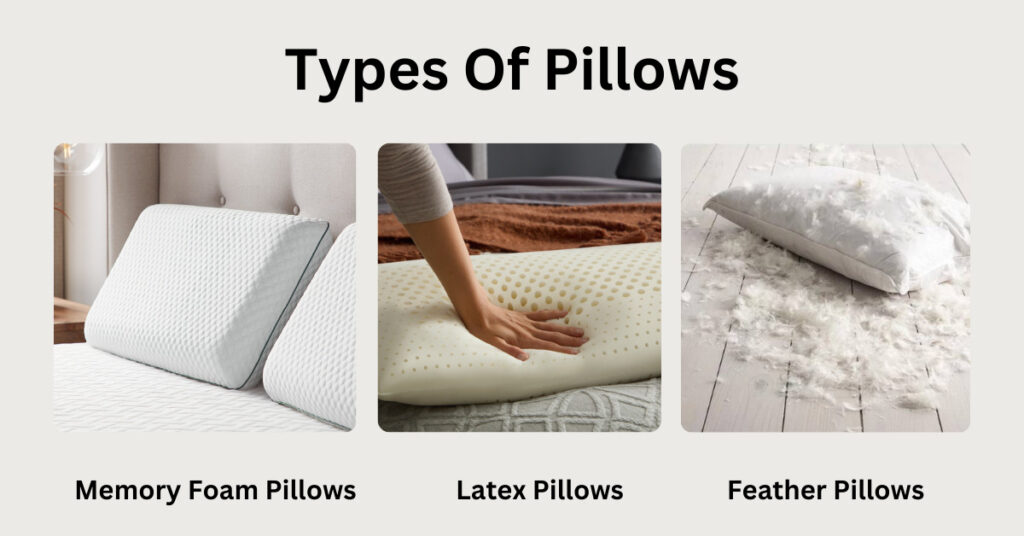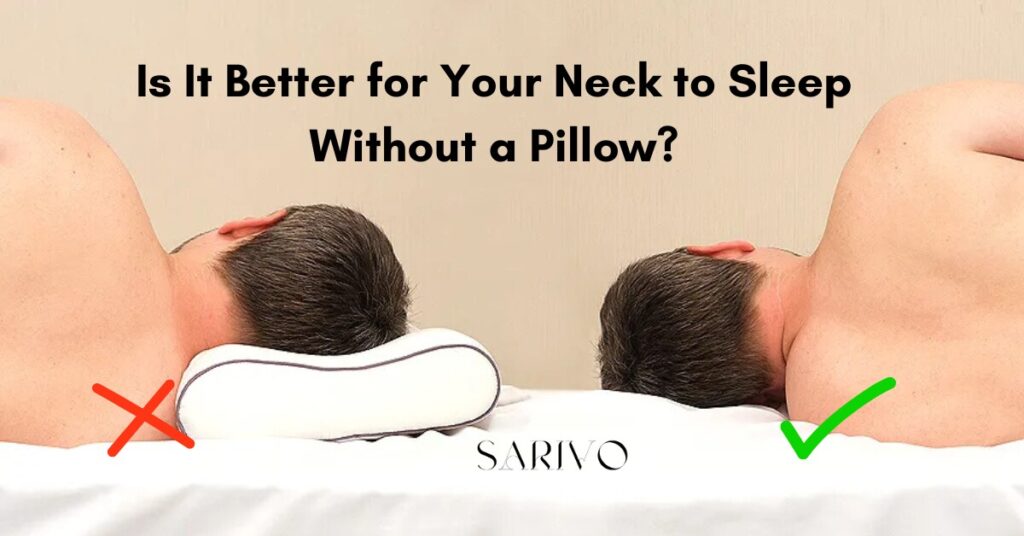Sleeping without a pillow can benefit your neck by maintaining natural alignment. It may reduce neck pain for some people.
Neck pain is a common issue affecting many individuals. Proper sleep posture plays a crucial role in preventing discomfort. While traditional advice recommends using a pillow, some find relief by sleeping without one. This practice can help keep the spine and neck in a neutral position.
It may reduce stress on the neck muscles, leading to fewer aches and better overall sleep quality. However, individual needs vary, so experimenting with different sleep positions and pillow options is essential. Understanding your body’s unique requirements will help you determine the best approach for a pain-free neck.
Sleep Positions
Many people wonder if sleeping without a pillow is better for the neck. The answer often depends on your sleep position. Different sleep positions affect neck alignment and comfort differently. Let’s explore how back, side, and stomach sleeping positions interact with pillow use.
Back Sleeping
Back sleeping is one of the best positions for the spine. It allows the spine to stay in a neutral position. This position can benefit from a pillow but choosing the right one is key.
Here are some tips for back sleepers:
- Use a thin pillow. It helps keep the head in line with the spine.
- Consider a cervical pillow. It supports the natural curve of the neck.
Benefits of sleeping without a pillow for back sleepers:
- Reduces strain on the neck.
- Helps prevent wrinkles and acne.
Potential drawbacks:
- Some may find it uncomfortable initially.
- It might not provide enough support for everyone.
Choosing the right pillow is crucial for back sleepers. They need a pillow that supports the neck’s natural curve. If you choose to go pillow-less, ensure your mattress offers adequate support.
Side Sleeping
Side sleeping is the most common sleep position. It can benefit from a thicker pillow to fill the gap between the neck and the mattress. Here’s what side sleepers should consider:
Important aspects for side sleepers:
- Use a firm and thick pillow. It supports the head and neck.
- Avoid too high or too low pillows. They can misalign the spine.
Benefits of sleeping without a pillow for side sleepers:
- May reduce some types of neck pain.
- Can be more comfortable for some individuals.
Potential drawbacks:
- Neck and shoulder pain from lack of support.
- Misalignment of the spine.
Side sleepers need proper neck support. A thick pillow helps keep the spine aligned. Without a pillow, it can be challenging to maintain good posture while sleeping on your side.
Stomach Sleeping
Stomach sleeping is generally the least recommended position. It can strain the neck and back. Here’s what stomach sleepers should consider:
Guidelines for stomach sleepers:
- Use a very thin pillow or none at all.
- Place a pillow under the hips. It helps keep the spine aligned.
Benefits of sleeping without a pillow for stomach sleepers:
- Reduces the angle of the neck.
- May decrease lower back pain.
Potential drawbacks:
- Neck strain from turning the head.
- Increased pressure on the spine.
Stomach sleepers often benefit from no pillow. It keeps the neck in a more neutral position. Adding a pillow under the hips can further help with spinal alignment.

Benefits Of No Pillow
Many people wonder, is it better for your neck to sleep without a pillow? While this might seem unusual, sleeping without a pillow has several benefits. Understanding these benefits can help you decide if this is the right choice for you.
Spinal Alignment
Sleeping without a pillow can improve spinal alignment. Here’s how:
- When you sleep without a pillow, your neck stays in a natural position.
- This helps keep your spine straight, reducing stress on your back.
- Maintaining a straight spine can prevent long-term back issues.
Let’s compare spinal alignment with and without a pillow:
| With Pillow | Without Pillow |
| Neck can be bent upwards | Neck stays flat |
| Possible strain on upper spine | Spine remains neutral |
Many people find that removing the pillow helps in keeping a more natural posture while sleeping. This can lead to a more restful sleep and fewer aches in the morning. Proper spinal alignment is key to a healthy back and neck.
Reduced Neck Pain
Neck pain is a common issue for many people. Sleeping without a pillow can help reduce this pain:
- Without a pillow, there’s no extra pressure on your neck.
- This can reduce tension and stiffness.
- Without the extra lift, your neck muscles stay relaxed.
Here are some quick benefits:
- Less muscle strain
- Improved sleep quality
- Better overall neck health
Many people report waking up without neck pain after ditching the pillow. This simple change can make a big difference. If you suffer from neck pain, consider trying to sleep without a pillow. It might be the solution you’ve been looking for.
Drawbacks Of No Pillow
Many people wonder if sleeping without a pillow is beneficial for their neck. While some believe it can improve posture, there are potential drawbacks. Understanding these drawbacks can help in making an informed decision. This section focuses on the drawbacks of sleeping without a pillow.
Discomfort
Sleeping without a pillow can lead to significant discomfort for many individuals. Pillows provide support and alignment for the neck and spine. Without this support, you might experience an uneasy feeling throughout the night.
Here are some common discomforts:
- Lack of neck support: Your neck may not be aligned properly with your spine.
- Difficulty sleeping: The lack of comfort can cause you to toss and turn.
- Restless nights: You might wake up multiple times, disrupting your sleep cycle.
Additionally, different sleeping positions can exacerbate these issues. For instance, side sleepers might find it particularly uncomfortable without a pillow. This discomfort can affect the quality of sleep, leading to daytime fatigue and irritability.
Muscle Strain
Another significant drawback of sleeping without a pillow is muscle strain. Without proper support, the muscles in your neck and shoulders can become strained. This can lead to pain and stiffness.
Common muscle strain issues include:
- Neck pain: Lack of support can cause the neck muscles to overwork.
- Shoulder stiffness: Improper alignment can lead to tension in the shoulders.
- Upper back pain: The strain can extend to the upper back area.
Muscle strain can also lead to long-term problems. Continuous strain may result in chronic pain conditions, impacting your overall well-being. Therefore, it’s essential to consider these potential issues when deciding to sleep without a pillow.
Pillow Types

Choosing the right pillow can significantly impact your neck health. Some people find that sleeping without a pillow helps their neck, while others swear by specific types of pillows. Different pillow types offer various benefits and support levels. Understanding these types can help you make an informed decision about what’s best for your neck.
Memory Foam
Memory foam pillows are popular for their ability to contour to your head and neck. This material provides excellent support and helps maintain spinal alignment. Here are some key points about memory foam pillows:
- Contouring Support: Memory foam adapts to the shape of your head and neck, providing customized support.
- Pressure Relief: These pillows distribute weight evenly, reducing pressure points.
- Durability: Memory foam is known for its long-lasting support and shape retention.
Memory foam pillows come in different styles, such as traditional, contoured, and shredded foam options. Some have cooling gel layers to regulate temperature. This variety allows you to choose the best fit for your sleeping style and comfort needs.
Latex
Latex pillows offer a natural and resilient option for neck support. Made from the sap of rubber trees, latex pillows are both eco-friendly and durable. Here are some benefits:
- Natural Material: Latex is hypoallergenic and resistant to dust mites and mold.
- Firm Support: Latex provides a firmer feel compared to memory foam, helping to keep your neck aligned.
- Breathability: Latex pillows have an open-cell structure, allowing for better airflow and temperature regulation.
There are two main types of latex pillows: Dunlop and Talalay. Dunlop latex is denser and firmer, while Talalay latex is softer and more breathable. Choose based on your preference for firmness and comfort.
Feather
Feather pillows are traditional and beloved for their softness and adjustability. Made from the outer feathers of ducks or geese, these pillows offer a unique set of benefits:
- Adjustable Loft: You can mold feather pillows to achieve the desired shape and support.
- Soft and Plush: Feather pillows provide a soft, luxurious feel that many people find comfortable.
- Lightweight: These pillows are easy to move and adjust during sleep.
Feather pillows can vary in firmness depending on the feather-to-down ratio. A higher down content means a softer pillow, while more feathers provide firmer support. Regular fluffing is necessary to maintain their shape and support.
Neck Anatomy
Is it better for your neck to sleep without a pillow? Understanding neck anatomy helps answer this question. The neck, or cervical spine, supports the head and allows movement. It’s made up of vertebrae, muscles, and ligaments. Each part plays a role in neck health and comfort during sleep.
Vertebrae Structure
The neck contains seven vertebrae, labeled C1 to C7. These small bones stack on top of each other. They form the cervical spine, which supports the skull and protects the spinal cord.
Each vertebra has a unique shape and function:
- C1 (Atlas): Supports the head and allows nodding.
- C2 (Axis): Enables head rotation.
- C3-C7: Provide stability and flexibility.
Between each vertebra is a disc. These discs act as cushions, absorbing shock and allowing smooth movement. The vertebrae also have openings for nerves to pass through. These nerves control muscle movements and sensations in the neck and arms.
Vertebrae alignment affects neck comfort. Misalignment can cause pain and stiffness. Sleeping without a pillow may help some people maintain proper alignment. But, this depends on individual anatomy and sleeping position.
Muscle Groups
The neck muscles support the vertebrae and enable movement. Key muscle groups include:
- Sternocleidomastoid: Turns and tilts the head.
- Trapezius: Moves the shoulder blades and supports the neck.
- Levator Scapulae: Lifts the shoulder blade and helps with neck rotation.
- Scalenes: Assist with breathing and neck flexion.
These muscles work together to maintain posture and control head movements. Strong, flexible muscles prevent strain and injury. Sleeping position affects muscle tension. A pillow can provide support, reducing strain on these muscles.
Sleeping without a pillow can relax the neck muscles. For some, this reduces tension and improves comfort. But, it’s important to find a position that supports the natural curve of the spine.
Whether you use a pillow or not, focus on neck alignment and muscle relaxation. This promotes better sleep and reduces the risk of neck pain.
Personal Preference
Is it better for your neck to sleep without a pillow? The answer often depends on personal preference. Some people feel great without a pillow, while others can’t sleep without one. Finding out what works best for you is key.
Trial And Error
Trying different sleeping styles can help you find the best choice for your neck. Not everyone is the same. Some people like a firm pillow; others like soft pillows or none at all. Testing options helps you find what works best.
Consider these steps for a trial and error approach:
- Sleep with a pillow for a week. Note how your neck feels in the morning.
- Try sleeping without a pillow for a week. See if your neck feels better or worse.
- Use different pillow types. Test memory foam, feather, and other kinds.
Keep a sleep journal. Write down your neck pain levels each morning. This helps you spot trends and patterns.
| Week | Pillow Type | Neck Pain Level (1-10) |
| 1 | Memory Foam | 5 |
| 2 | No Pillow | 3 |
| 3 | Feather Pillow | 7 |
Seeing the results in a table helps you decide what works best for you. Pay attention to changes over time.
Individual Comfort
Comfort is very personal. What feels good for one person may not feel good for another. Find what makes you feel best.
Consider these factors:
- Sleeping Position: Back sleepers might benefit from no pillow. Side sleepers often need a pillow to support their neck.
- Bed Firmness: A soft bed can make a pillowless sleep more comfortable. A firm bed might need a pillow for neck support.
- Health Conditions: People with neck pain or sleep apnea often need specific pillows for better support.
Also, think about how you feel during the day. Do you have less neck pain if you sleep without a pillow? Are you more rested and alert? These signs help you find your comfort level.
Everyone’s body is different. Listening to your own body is important. Try different things to see what helps you sleep best.
Age And Pillow Use

Is sleeping without a pillow better for your neck? The answer may vary depending on your age. Different age groups have different needs and sleeping habits. Let’s explore how age affects pillow use.
Children Vs. Adults
Children and adults have different requirements for pillow use. Children’s necks are more flexible and their spines are still developing. Using a pillow might be optional for them. Here are some key differences:
- Spinal Alignment: Children have smaller heads and shorter necks. Their spines are more aligned when they sleep flat.
- Comfort Needs: Kids might find pillows uncomfortable. They move around more and can sleep in various positions without issues.
- Growth Factors: A child’s spine is growing. Sleeping without a pillow can help in natural alignment.
Adults, on the other hand, generally need pillows for support. Adults’ spines are less flexible and their necks require more support. Here are some points to consider:
- Spinal Curvature: Adults have a more pronounced spinal curvature. A pillow helps maintain this curvature.
- Neck Support: A good pillow can prevent neck pain and provide adequate support.
- Sleep Quality: A suitable pillow can improve sleep quality by providing comfort and support.
Elderly Considerations
The elderly have unique needs when it comes to pillow use. Aging affects spinal health and neck support becomes crucial. Here are some important points:
- Spinal Degeneration: With age, the spine may degenerate. Proper support is needed to avoid discomfort.
- Neck Pain: Older adults are more prone to neck pain. A supportive pillow can help alleviate this.
- Comfort and Sleep Quality: A comfortable pillow can improve overall sleep quality for the elderly.
Choosing the right pillow is vital for older adults. Memory foam and orthopedic pillows are often recommended. These pillows offer better support and align the neck and spine properly.
| Age Group | Pillow Needs | Recommended Pillow Type |
| Children | Optional | Soft, Thin |
| Adults | Necessary | Medium Firm |
| Elderly | Crucial | Memory Foam, Orthopedic |
In summary, the need for a pillow varies with age. Children might not need one, adults generally do, and for the elderly, it’s essential.
Consultation With Experts
Is it better for your neck to sleep without a pillow? This question has many people puzzled. To get the right answer, it is crucial to consult experts. These professionals can provide insights based on their knowledge and experience. In this section, we will discuss the views of chiropractors and physical therapists.
Chiropractors
Chiropractors are experts in spine health. They understand how the spine aligns with the rest of the body. According to many chiropractors, sleeping without a pillow can have both benefits and drawbacks.
- Can promote natural alignment of the spine.
- Reduces the risk of neck pain.
- May improve breathing during sleep.
- Not suitable for everyone.
- Can cause discomfort for side sleepers.
- May worsen some pre-existing neck conditions.
Chiropractors suggest that back sleepers might benefit the most from no pillow. It helps to maintain the natural curve of the spine. But, side sleepers might need a pillow for proper neck support. Also, chiropractors recommend trying a thin pillow if you want to transition away from using one.
| Sleep Position | Recommendation |
| Back Sleeper | No pillow or a thin pillow |
| Side Sleeper | Use a supportive pillow |
| Stomach Sleeper | Consider no pillow |
Physical Therapists
Physical therapists specialize in the mechanics of the body. They focus on improving movement and reducing pain. They also have valuable insights into whether sleeping without a pillow is better for your neck.
- May help reduce neck stiffness.
- Promotes a more natural sleeping position.
- Could alleviate certain types of headaches.
- Not ideal for everyone.
- Can cause strain on the neck for some people.
- May not be suitable for those with specific neck injuries.
Physical therapists recommend assessing your neck and back health first. For those with neck pain, they suggest consulting a professional before making changes. They often advise a gradual transition if you want to sleep without a pillow.
- Start with a thin pillow and reduce thickness over time.
- Pay attention to how your neck feels in the morning.
- Consider exercises to strengthen neck muscles.
| Sleep Position | Pillow Recommendation |
| Back Sleeper | Thin pillow or no pillow |
| Side Sleeper | Thick and supportive pillow |
| Stomach Sleeper | Very thin pillow or no pillow |
Physical therapists often stress that personal comfort is key. If sleeping without a pillow causes discomfort, it might not be the best option for you.
Conclusion
Choosing to sleep without a pillow depends on personal comfort and neck health. Some find relief, while others need support. Experiment to discover what suits you best. Prioritize a restful night’s sleep and consult a healthcare professional if unsure. Your neck will thank you for making the right choice.

